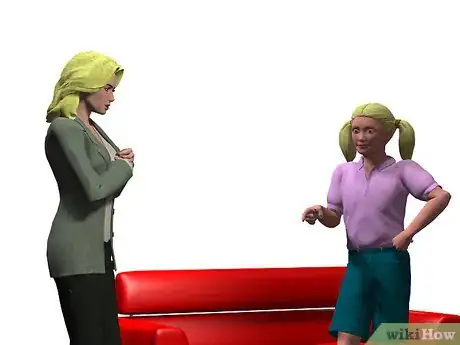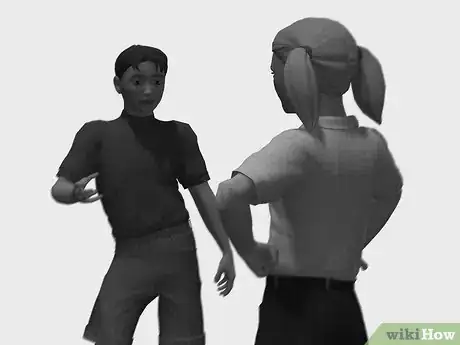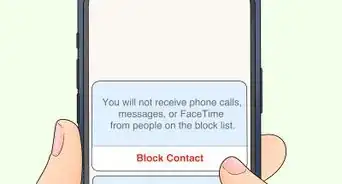wikiHow is a “wiki,” similar to Wikipedia, which means that many of our articles are co-written by multiple authors. To create this article, 12 people, some anonymous, worked to edit and improve it over time.
This article has been viewed 42,884 times.
Learn more...
As children become older, a desire to be liked and accepted becomes increasingly important. In some instances, this might cause your child to continue a friendship despite the fact they are being continuously bossed about. If you feel that your child has grown hesitant about standing up for what they prefer out of fear of ruining the friendship, it's time to provide some help. Teaching your child how to handle this situation is an important skill that will set your child in good stead for handling bossy people throughout life. Your child will learn that they don't need to put up with a bossy friend and indeed, may even find a way to quell the bossiness and preserve the friendship.
Steps
Helping Your Child Deal With Bossiness
-
1Role play with your child.[1] Have your child act the part of the bossy friend. In turn, take on the role yourself of acting the part of a child who stands up to the bossiness. Model through role-playing how you generally want your child to react to the bossy friend.
- For example: Suggest that the situation is one where the friend wants to go the beach but your child wants to stay and study. You could tell your child to act the part of the friend wanting to go to the beach during study time, while you play the role of the child resisting this offer. It might go something like this:
- "Let's go to the beach. Studying is so boring."
- "I'd love to go to the beach but not now/today. I have to complete my homework assignment tonight. If I don't get it finished, I will be under pressure from the teacher and likely I'll get a bad mark. I don't want a bad mark. Maybe we can go to the beach tomorrow instead."
- "You're stupid. The sun is out now, it will rain tomorrow. Why don't you do the homework when it rains?"
- "I don't like it when you suggest I am stupid. That makes me feel unhappy. I am going to do my homework now so that I don't feel pressured tomorrow. If it rains tomorrow, we can go to the beach on a day that it's not raining. And hey, I can help you finish your homework too if you like." And so on...
- For example: Suggest that the situation is one where the friend wants to go the beach but your child wants to stay and study. You could tell your child to act the part of the friend wanting to go to the beach during study time, while you play the role of the child resisting this offer. It might go something like this:
-
2Discuss different options and approaches your child can take with this friend. Either after or during the role play, stop and discuss what approaches are likely to work best.[2] Does your child want to be very assertive or will your child feel more comfortably taking a softer approach? Through asking questions and seeing your child's reaction to the role play, you will likely quickly find out which approach would work best for this particular friend.
- Some people do not take others seriously unless they are being told something forcefully. Other people respond to a softer approach with listening and understanding, but a firm and no-nonsense behavior will sure work better. As you role play, your child will probably alert you to the other child's personality, by saying things like "But Shannon doesn't act like that" or "No, no, John would be yelling at me by now."
- Keep in mind the individual traits of the bossy friend. Help your child to formulate this knowledge in their own word choice and voice tone when confronting the bossy friend.
-
3Help your child write down the words they want to say to the bossy friend.[3] This can be a short speech which is memorized or just some key points. This way, your child will know the exact words they will say to the bossy friend. Your child may feel nervous when they confront the bossy friend, so knowing in advance what to say (or the general idea) is helpful.
-
4Have your child rehearse which approach and words they will use when standing up for their preferences. Again, the role-playing is very helpful in clarifying the best responses, as well as giving your child the opportunity to rehearse.
- Once the exact approach (softly-softly or boldly-boldly) has been chosen and exact words have been written or memorized, you can model for your child how to put the two together. Then, have your child practice exactly what they will do and say to the bossy friend. Your child should practice until they feel completely comfortable.
-
5Pick a time for the confrontation. Your child needs to decide if they will wait until the friend starts bossing, or if they want to confront the friend up front, unprovoked. Should it be before or after school? Perhaps this bossy friend will be in a better mood to listen after lunch, although this assumption is taking too much for granted.The timing is an individual decision your child needs to make, along with feeling it's okay to be flexible about it if the first chosen time doesn't feel right.
-
6Tell your child to be prepared for different reactions from the bossy friend. While your child knows their friend best, your child may not know how the friend will respond. Even though your child has picked the best words and approach, the bossy friend may get angry or become even bossier. The bossy friend may also apologize and your child should be ready to accept the apology and move forward with the friendship. So, after the inescapable "confrontation", your child will have to take a stand and accordingly so will you, as a parent.
Community Q&A
-
QuestionWhat is your child is bossy and have lost friends, what consequences do you give them for being bossy and mean to their friends?
 Community AnswerDon't punish them at first. Explain to them calmly but firmly why they are losing friends. If it still continues, start taking away things that involve the friends they still have, play dates, sleepovers, parties, or playing at the park with them.
Community AnswerDon't punish them at first. Explain to them calmly but firmly why they are losing friends. If it still continues, start taking away things that involve the friends they still have, play dates, sleepovers, parties, or playing at the park with them. -
QuestionWhat if the bossy kid doesn't accept "no" (she ignores soft/bold/repeated no's) and resorts to crying if she doesn't get her way? Circumstances throw my son and her together at least once a week, so he can't ignore her.
 Lubinko JankovicCommunity AnswerTell your child that he has to ignore her when they are thrown together. I had a child with a similar problem, I told the teachers and principals about it, and they were aware of the issue and explained to her the meaning of "no." Even though they only saw each other once a week, they put them in different classes, and I haven't had any problems like this so far.
Lubinko JankovicCommunity AnswerTell your child that he has to ignore her when they are thrown together. I had a child with a similar problem, I told the teachers and principals about it, and they were aware of the issue and explained to her the meaning of "no." Even though they only saw each other once a week, they put them in different classes, and I haven't had any problems like this so far. -
QuestionWhat if my daughter's friend being bossy is a regular pattern?
 Community AnswerThere's a difference between being a little bossy and being too bossy. It depends on how far she's taking it. If she's being overwhelmingly bossy, then you really should talk to her. If she's just a bit bossy, then that could just be who she is.
Community AnswerThere's a difference between being a little bossy and being too bossy. It depends on how far she's taking it. If she's being overwhelmingly bossy, then you really should talk to her. If she's just a bit bossy, then that could just be who she is.
Warnings
- Be prepared for the bossiness to return. While it is great that your child want to give this friend a chance, help your child to understand that a person is who they are, and it is hard to change. However, your child now has the skills to call the bossiness out and focus on the behavior as unwanted, rather than seeing it as the whole friendship.⧼thumbs_response⧽
- No one likes getting called out for bad behavior. Be prepared to lose a friend if the bossy friend takes this too personally and has no intention of changing the bossy behavior.⧼thumbs_response⧽




































































